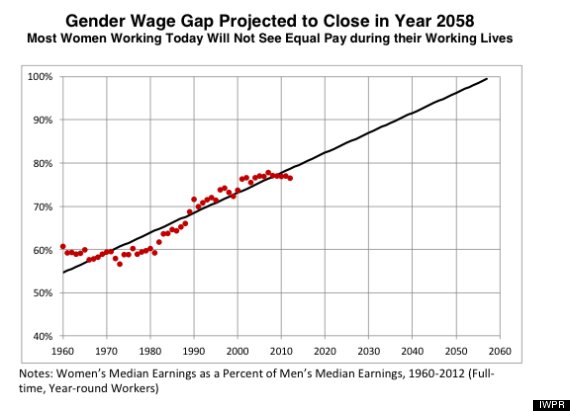 Most women that are employed today will probably retire before they see pay equality in the workplace.
Most women that are employed today will probably retire before they see pay equality in the workplace.That's because the gender wage gap -- or the difference between average full-time pay for women and men -- isn't expected to close until 2058, according to a projection from the Institute for Women’s Policy Research, a think tank focused on women’s policy issues.
The amount of time researchers project it will take for the pay gap to close has actually gotten worse since IWPR began doing this analysis a few years ago, according to Heidi Hartmann, IWPR’s president. You can blame that on the fact that women's real earnings have essentially remained flat over the past few years, slowing their progress in catching up to men.
Women earned about 77 cents for every dollar that men earned last year, the Census Bureau reported last week, a figure that’s stayed roughly the same since 2007, before the economic downturn.
A combination of reasons is likely to blame for why female workers’ earnings aren’t catching up to mens’ more quickly, Hartmann said. First of all, the fact that wage growth has been slow for the nation’s bottom earners affects women more than men because they’re more likely to be concentrated in low-paying sectors.
In addition, America’s lack of family-friendly medical leave and child care policies has pushed women out of the workforce, further decreasing their earning potential. Still, it’s hard to say what exactly is keeping women’s wages from going up relative to men’s, Hartmann said, though a lack of vigilance is at least partially to blame.
“I’m not sure any of us are convinced we know the real reason why,” she said. “In general there's not enough attention in society to the protections we already have in law.”
Original Article
Source: huffingtonpost.com
Author: Jillian Berman
No comments:
Post a Comment